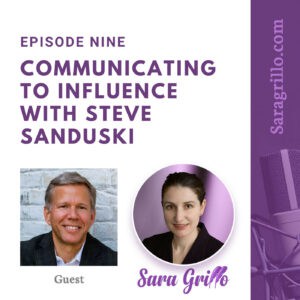I interviewed a random group of affluent investors about what they need from a financial advisor, at the same time as surveying a random sample of financial advisors about what they say they feel their clients need from them. I can share with you what financial advisors say.
Shockingly, there was almost a total disconnect between what the two groups said. The results imply that most financial advisors have a long way to go before they are able to position themselves as attractive to affluent individuals. Read on to learn if you are classified as the “out” group — and if so, here’s what you should do.
By the way, thanks for joining me.
For those of you who are new to my blog/podcast, my name is Sara. I am a CFA® charterholder with experience as a financial advisor. I have a weekly newsletter in which I talk about financial advisor lead generation topics. It is best described as “fun and irreverent.” So please subscribe!
So if you’re looking for some straight up talk then you’ve come to the right place!

What Financial Advisors Think Clients Want
I asked a random sampling of financial advisors the question, “What is the #1 thing that you believe that clients want from a financial advisor?” Here’s what they said in response to the question of what people want from their financial advisor:
- To listen
- Trust and confidence in their ability.
- They want trust an advisor is ethical and trust an advisor is competent.
- People want leadership and direction. They need to be told what to do – not given five different options to work over…We need to make an unusual effort to get to know them, their family, their business, their history, marriage, fears, dreams, etc.
- Understanding their needs, goals and aspirations; trustworthiness; competence; unbiased advice.
- Unfortunately, I would say the number one expectation of clients vis-à-vis their financial advisor is that the clients will make money…I would also say that secondly clients crave regular, ongoing money advice and contact from their advisors…I’ve found that short but frequent contact seems to be helping cement my advisor clients into more of an intimate relationship; a “personal moat”, if you will.
So what does this tell us?
While they sound so cute and sweet, you’ll notice that every single advisor gives a “spiel.” Almost all of them seem to be reciting some kind of ingrained marketing pitch that sells the relationship. The responses all pertain to the personal characteristics of the advisor. Focused on how they meet the emotional needs of the client. Only one discussed delivering tangible performance results and he appeared rather unexcited about it.
It was also interesting to see that although many advisors claim to offer a customized service, not even one advisor said that every client has different needs. They all seem to perceive clients as wanting the same thing.
By the way, I wrote an e-book called, “47 Financial Advisor LinkedIn Messages and Sequences that will NOT make you look Stupid. “ If you are a financial advisor trying to meet new clients over LinkedIn or other social media sites, you can download it here.
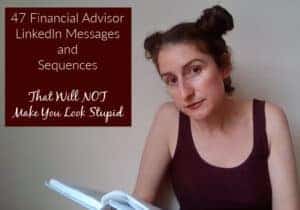
What Affluent Individuals Really Want from a Financial Advisor
On the flip side, 8 high net worth individuals were asked the question, “What is the #1 thing you want from a financial advisor that you find that many are not willing or able to give you?” These affluent individuals were selected on the basis of either having $1MM net worth or more, or earning $200k annual income or more.
Here are their responses to the question of what people like them want from a financial advisor.
- An individualized assessment that takes into account my particular situation. I feel like most financial advisors have a boilerplate spiel that they trot out for potential clients.
Given the responses the advisors gave in the last section, would it be hard to believe that most of them are caught up in some “spiel?” You decide.
Many advisors don’t take the time to analyze an investor’s account during the prospecting phase. This is because they are operating under a heavy quota. They have a certain number of meetings they must attend per week to meet their numbers. But as this example illuminates, affluent people want just the opposite. They want to know that the advisor is going to invest their time and that they won’t be viewed as another number. And the fact that many advisors see them this way – it shows.
- Pushing me out of my comfort zone so I really think hard about objectives and risk/reward…I need to be made to think deeply as pressure of everyday life gets in way.
This answer reveals that most advisors aren’t asking the right questions. It’s easy to see how this could be true. Most financial advisors have a boilerplate risk tolerance questionnaire that they use when determining an asset allocation. But to an affluent person with sophisticated needs, risk tolerance isn’t a simple calculation. There’s alot more under the surface that the advisor has to work hard to uncover. Instead of checking a box, take the time to understand them emotionally.
- Unique ideas backed by interesting research. Any monkey can tell me to buy an ETF or about a equity-to-bond mix for my portfolio. What I value is someone who can give or email me a portfolio of 20 or 30 equities that are diversified and that they have solid research on to support their investments. I would really pay in the 5% range to 1.5 and 15% range for a person who builds me a portfolio of interesting equities. For example, a hedge fund except on the advisor side. Problem is most advisors are too busy selling. They are not busy enough making their clients good return, very average and not worth fees often.
This is a response from someone who seems to be frustrated by advisors who underestimate his intelligence. Most financial advisors are salespeople who offer generic products that won’t impress many affluent people who have had some exposure to investing on their own. Remember, these people don’t live in a vacuum. Some of them have worked in finance before or have been exposed to investment concepts through education or self study.
- The most important thing from a financial advisor is to free my time. That is, I need to have the confidence and trust. Then I don’t need to look at my financial as much as I do now. While in the past I loved playing with my portfolio and optimize it, I find it a total waste of time now. And time is the most precious thing I have.
This comment is directly at odds with the financial advisors who said that affluent clients want their attention. It would seem that this person desires the opposite; for the advisor to create, not consume, his time.
- I would also need a financial advisor to be a fiduciary. Otherwise I wouldn’t be able to trust their advice and then what is the point of that?! Most wormed their way out of that question without clearly answering, protesting that they always looked out for their clients.
This is a very tenuous point within the investment marketplace. If you’re paid in a way that potentially compromises objectivity in any way, for goodness sake, be upfront about it.
Most financial advisors who are not held to the fiduciary standard will claim to follow its guidance anyways. For the more legally savvy audience this destroys trust instantly.
- The number 1 thing I want from my financial planner is a true “holistic” strategic plan for my entire portfolio. Meaning not just a bunch of graphs and charts about my ROI, but a plan of what I need to do year by year from not until my projected retirement to maximize me achieving my goals.
You’ve seen the yearly annual review packet, right? Unfortunately it is best as a cure for insomnia. This response is screaming, “Please don’t waste my time!” Spare them the “vanity metrics” and focus on what all the analytics mean to the client.
- Information on new ETFs/mutual funds being formed in obvious hot industries such as AI & Robotics. Sometimes you can make money on newbie funds that are gathering assets as also on upside of industry dynamics.
This echoes other comments we’ve heard. Most advisors aren’t coming to the table with solutions that clients haven’t already heard of or couldn’t put together on their own, hence making it hard to justify the fees.
- Tools for coping with feelings of being financial overwhelmed
Yes, affluent people worry about money just as much as anyone else. Don’t assume that just because your client is a millionaire that it makes life any easier.
What smart, rich people don’t get about financial advisors
Gathered from real conversations with wealthy people – 10 things intelligent, discerning prospects don’t get about financial advisors.
- How can this financial advisor service me fully when I see him/her always blogging/in the news/on social media?
- What does this $30k in fees on my $3MM get me that it doesn’t get my buddy paying $10k on his $1MM?
- What if the financial advisor doesn’t have the expertise I need in one particular area – how do they get it in order to serve me?
- How do I know they’ll serve me with the same level of customized service I want from a small firm, if they’re a bigger firm?
- Do I want to do this myself, pay someone else, or a combination of both?
- Why can’t I just try this advisor out for a year and fire them if it doesn’t work?
- Is it better to work with a bigger firm?
- Do I need to invest in a hedge fund or private equity vehicle to get returns more than the market?
- Is there a disadvantage to having my financial advisor also prepare my tax return?
- After they do the initial portfolio clean up, how much help do I really need on an ongoing basis and is that worth paying for?
Some of these are not what you expected, right?
But you can see the pattern – they’re not the nuts-and-bolts type questions (ex: Vanguard vs. DFA). They’re more conceptual, higher level thoughts, almost philosophical. One of the takeaways here is that there isn’t enough emphasis on this. It’s not what you think they should ask about, it is what they really ask about.
There’s a huge disconnect.
Most advisors have no clue and/or ignore where the person is coming from initially. I encourage you to begin your prospecting conversations by asking the person to tell you their questions, and go from there. Or even say to them, “Some of the typical questions people have are x and y. Are any of these on your mind?”
When these questions are skipped over, it sets up the process to fail but by addressing them you are in a much better position to understand them and hence identify how you can really be of use to them.
Bridging the Gap
It’s clear from the survey that there’s a large disconnect between what clients say they want and what advisors think they do. How can advisors narrow the gap?
Stop Trying to Be BFF
Financial advisors make the mistake of trying to be BFF, or best friends forever, with every single affluent person they prospect to. Give up trying to make them fall in love with you on personality. Assume that they don’t have time for more friends.
Acknowledge that affluent people have probably heard it all before. Don’t show up and try to make friends while showing them the same products as everyone else. This is going to make their eyes glaze over.
Financial advisors cringe at the idea of splitting fees with a professional money manager who can “white label” a solution for them. If this is you, hear the message that affluent people aren’t going to give you their portfolio just because they like you and appreciate that you sent them a birthday card.
Invest in Powerful Solutions
When you’re dealing with this level of wealth, it’s not just the charisma or personality; you have to bring some heavy technical expertise to the table. If you don’t show them better investment selection or better performance than what they could do on their own, you aren’t going to win the business. Or if you do win it, you aren’t going to have it for very long.
Split the fees with a solid, outsourced money manager with an outstanding track record. It’s better to have a smaller cut of the fee than no cut of the fee. You may whine, but what you lose in the fee split you’ll make up in volume of business won from all the advisors who aren’t willing to do this.
If you’re going to manage the money yourself by using Morningstar software or something like that, you should focus on investors with fundamental requirements such as the standard ETF, asset allocation, and mutual fund solutions that most advisors offer. Those people are most likely not going to be affluent individuals.
Stop Asking Bad Questions
Years back when I was a financial advisor, my training programs taught me to orient the presentation towards getting a second meeting or a referral rather than getting to the bottom of what the real problem was that the client was facing.
In retrospect, all I did was ask bad questions.
If husband and wife had no life insurance, the questioning was geared towards getting them to fill out an application. If they wouldn’t, I was taught to move on to the next prospect. I was never taught to probe into their emotions surrounding their finances or to try to understand why they had certain attitudes.
For example, maybe they were raised in a family where nobody had life insurance or nobody ever passed away suddenly, and so they grew up thinking it was unnecessary. Perhaps they were feeling worried about possibly getting laid off and were struggling to find a way to shell out the $50 extra each month for my fee. But it never got that far.
When you ask the right questions, the walls come down. Asking a bad question, on the other hand, makes the walls come up. Financial advisors are always sending messages over LinkedIn that make them look stupid for example.
Examples of bad financial advisor questions include:
- “Is it right to leave your family with a replacement stream of income if you were to pass away suddenly. No? Then how can it be wrong to do the right thing?” (shaming them into buying life insurance)
- “If you were to go away on a weekend holiday, who would be the three people you’d ask to go with you” (too intrusive, also self-serving and obviously probing for a referral)
- “What would be on your wish list if you had $1MM” (greed-inducing)
- “If I could show you a way to get more insurance coverage for every dollar you’re spending in premium, would you do this?”
- “If I could tell you three ways to reduce risk in your portfolio, would you do this?”
- One trainer taught us to bluntly ask “why” every time a client voiced an objection. Now that I have a 3 year old child, I can see how this response is really agitating.
Bad questions turn conversations into a stilted dialogue that never goes beneath the surface because the client doesn’t trust you. By the way, if you are looking for LinkedIn scripts and messages that financial advisors can use when they want to meet clients on social media, check out my e-book.
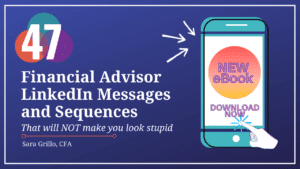
Ask Better Questions
The real value that an advisor brings is being able to connect financial outcomes with the way a client truly feels, a truth that the client himself can not access on his own.
This is a point that many advisors neglect, the process of discovery and understanding past what clients say and what they truly mean.
Good questions build trust.
Examples of good questions:
- “What was your experience with your last financial advisor – what did you like and dislike?”
- “What are the three words that come to mind when I say the words ‘investment performance’ ?”
- “If there is one thing you are looking for me to provide to you that you can not access on your own, what would it be?”
- “On a scale of 1 to 10, how much of what I’ve said do you actually believe.” (this is a gutsy one, but if the person responds honestly then you’ll get to the real objection)
- “If you were to wake up tomorrow without a penny to your name, what is the #1 thing that happened and wiped out your wealth?” (this tells you what they’re really afraid of)
- “Who do you think is the person in your life most responsible for influencing your present attitude towards your money?”
You can see that here I’m making it clear that I’m trying to understand them below the surface, not in this situation of trying to sell them investment services. I’m making an effort to understand their holistic attitude towards money and how that is impacted by their overall life.
Summing It Up: How Financial Advisors Can Get Rich Clients
Financial advisor and client, and never the twain shall meet. Here’s how to break through the barriers, in a nutshell.
I’ve said before that most financial advisors struggle to create a big brand, or any brand, for themselves at all. If you want affluent people to look at you as different from every other financial advisor out there, then stop acting like every other financial advisor out there.
The two major ways that advisors fall short of wealthy people’s expectations is the lack of compelling investment offerings (that won’t waste their time) and failure to understand their unique situation.
Sara’s Upshot
What’d ya think? Was this helpful?
If yes…
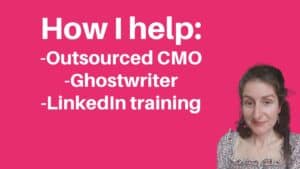
- I am an outsourced CMO for companies who need regular, full service marketing – blogging, social media posts, newsletters, etc.
- I am an hourly consultant for those who just need one-time or recurring guidance
- People hire me as a ghostwriter to write content for a project fee
- I have a social media training program
- I have a book about what to say on LinkedIn messenger
Just letting ya know, in case you need me at some point.
-Sara G
Learn what to say to prospects on social media messenger apps without sounding like a washing machine salesperson. This e-book contains 47 financial advisor LinkedIn messages, sequences, and scripts, and they are all two sentences or less.
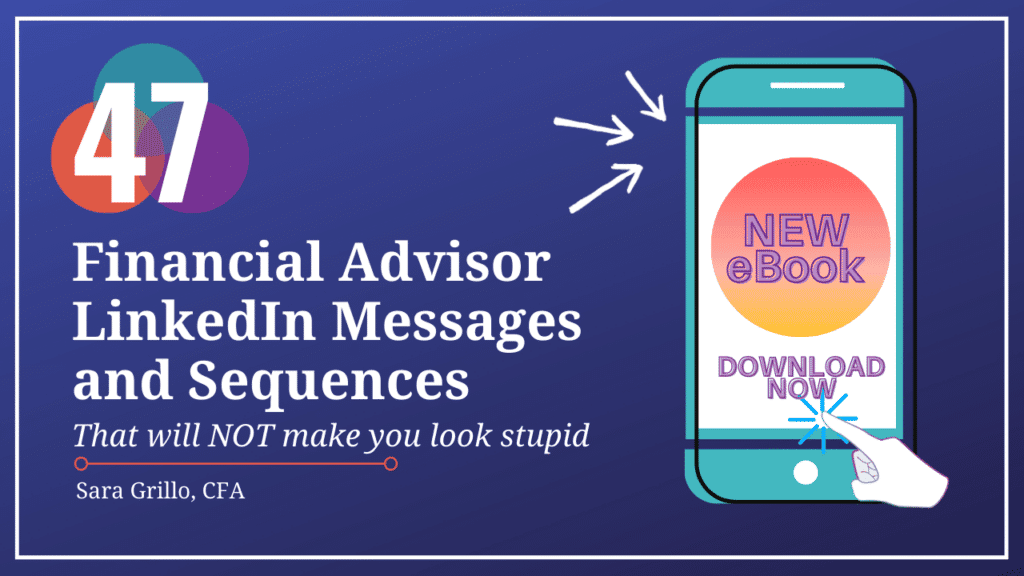
You could also consider my financial advisor social media membership which teaches financial advisors how to get new clients and leads from LinkedIn.
Thanks for reading. I hope you’ll at least join my weekly newsletter about financial advisor lead generation.
See you in the next one!
-Sara G



